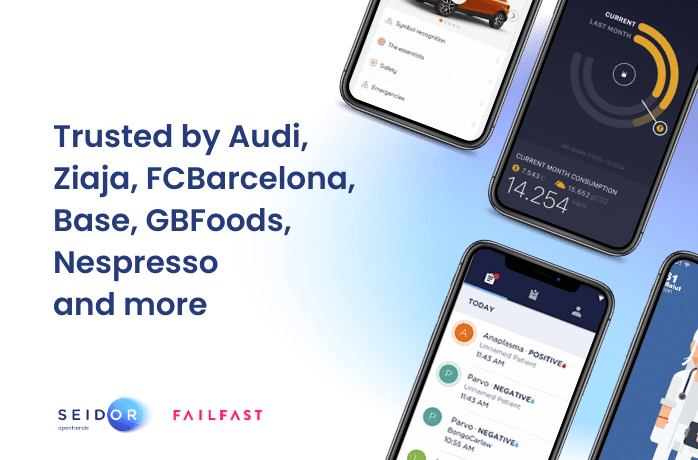
ServiceServicioServei
Omnichannel Strategy and Development
Omnichannel development coherently integrates the brands’ different interaction methods available to customers (e.g., online, mobile device, physical store, wearables, etc) to strengthen customer loyalty, improve efficiency and capture revenue growth.

Driving Revenue Growth through Seamless Customer Experiences
SEIDOR Opentrends delivers cutting-edge omnichannel solutions that integrate diverse customer touchpoints, driving revenue growth, enhancing operational efficiency, and fostering unparalleled customer loyalty. Our data-driven approach ensures a cohesive brand experience across all platforms, from web and mobile to IoT and voice interfaces.

What does that mean for you?
- Unified Customer Journey: Create a seamless, brand-consistent experience across all channels and devices.
- Data-Driven Personalization: Leverage advanced analytics to tailor interactions and boost customer satisfaction.
- Revenue Stream Diversification: Unlock new digital revenue avenues through innovative channel integration.
- Operational Efficiency: Streamline processes and reduce costs through centralized omnichannel management.
- Future-Proof Architecture: Build scalable solutions that adapt to emerging technologies and changing consumer behaviors.
FAQs about Omnichannel Strategy Development
What is omnichannel strategy development?
Omnichannel strategy development is the process of creating a seamless customer experience across all channels, including online, in-store, and mobile. This involves understanding the customer journey, identifying touchpoints, and creating a unified experience that meets the customer's needs at every stage.
Why is omnichannel strategy development important?
Customers expect to be able to interact with businesses in the way that is most convenient for them. Businesses must be present on multiple channels and provide a consistent experience. Omnichannel strategy development can help businesses improve customer satisfaction, increase sales, and potentially reduce costs.
How can I develop an omnichannel strategy?
Data is essential for omnichannel strategy development. It can be used to understand customer behavior, identify touchpoints, and create a unified experience. Here are some of the main steps in developing an omnichannel strategy:
- Understand the customer journey: Map out the stages a customer goes through when interacting with your business or experiencing your product/service, from awareness to purchase to after-sales.
- Identify touchpoints: Once you understand the customer journey, identify the different touchpoints that customers have with your business. These include your website, mobile app, social media channels, and brick-and-mortar stores.
- Create a unified experience: Ensure your customers have a consistent experience across all touchpoints.
Proven app/web development omnichannel solutions
Our Expertise
Our multidisciplinary Agile Transformative Teams combine technology specialists with creative experts who excel in diverse fields and technologies.
-
Full-Stack Development
-
Mobile Innovation
-
Enterprise Integration
-
Emerging Technologies
-
UX/UI Design

Proven Track Record
- Developed enterprise websites serving 1M+ monthly active users
- Engineered online banking systems supporting 20M+ active users
- Partnered with global leaders in automotive, e-health, and finance sectors for connected device solutions

Why SEIDOR Opentrends?

Some omnichannel client stories
- Viral Chatbot Development: Created AI-powered conversational interfaces that became integral to users' daily routines, driving engagement and brand loyalty. View Case Study
- Mobile World Congress App: Annual development of cutting-edge mobile applications for a premier global tech event, consistently delivering innovative features and enhancing attendee experiences since 2014.
- Automotive Innovation: Pioneered the first Apple CarPlay app from a major car manufacturer in 2016, setting new standards for in-vehicle connectivity. View Case Study
- High-Performance Election Platform: Developed a second-screen application handling over 300,000 interactions per minute during critical electoral events, incorporating gamification to boost citizen engagement.
- Energy Management Solution: Designed Wibee for Circutor, an intuitive multi-platform app enabling real-time energy consumption monitoring, target-setting, and forecasting across mobile and desktop devices. View Case Study
- Media Omnichannel Strategy: Implemented a comprehensive solution for a leading Spanish newspaper, ensuring content accessibility across mobile, tablet, Smart TV, Chromecast, and wearable devices.
- Healthcare Interoperability: Engineered Fuse for Abaxis, a web-based integration system connecting diverse medical diagnostic and laboratory devices, streamlining data flow and improving patient care. View Case Study
- CPG Digital Transformation: Achieved significant ROI for GBFoods by revamping their Spanish and Italian web portals with a mobile-first design, enhancing brand experience without compromising SEO performance. View Case Study
- Enterprise Resource Management: Developed a sophisticated customer service portal for Danone, capable of managing and tracing millions of invoices, improving operational efficiency and customer satisfaction.
Elevate your brand. Empower your customers. Accelerate your growth.

